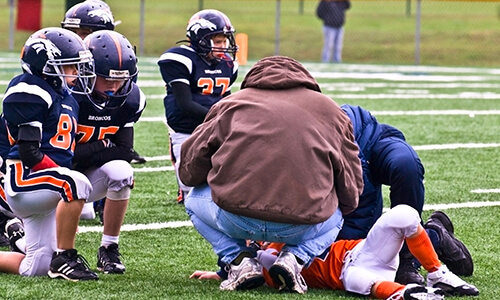Concussion Response
With proper care, most concussions will cause temporary symptoms and you can expect a full recovery.

Concussion Response
Managing an injury you can’t easily see, like a concussion, can be challenging. With proper care, most concussions will cause temporary symptoms and you can expect a full recovery. However, when mismanaged, concussions can result in long-term symptoms and have a profound impact on your overall well-being.
Recent research suggests the majority of concussion symptoms will resolve within a month of injury. However, approximately 20 percent of concussion patients have symptoms lasting more than one month. If you or a loved one falls into that category, make sure to review our Post-Concussion Syndrome resources.
The immediate response to a possible concussion plays an important role in your recovery. To best manage concussions, the Concussion Legacy Foundation Canada recommends the steps outlined in this easy-to-read guide and detailed below.
What to do if you suspect a concussion
Concussions aren’t easy to diagnose. There is no scan to easily spot a concussion, and symptoms vary from person to person. As a rule of thumb, any time someone experiences a blow to the head or body, it’s important to watch for the potential signs of a concussion.

Signs of a concussion
- Balance problems
- A glazed look in the eyes
- Amnesia
- Delayed response to questions
- Forgetting an instruction, confusion about an assignment or position, or confusion about the game, score, or opponent
- Inappropriate crying
- Inappropriate laughter
- Vomiting
- Loss of consciousness
While concussion signs are often observable from the outside, It’s important to note that many concussion symptoms are not. Symptoms, such as memory loss, sensitivity to light or noise, and sleep issues, may also be delayed. No matter when symptoms present, proper concussion response is crucial to recovery.
For a deeper dive, listen as CLF co-founder and medical director Dr. Robert Cantu talks about concussion response and busts common concussion myths on episode one of the Concussion Game Plan Podcast.
How should you respond to a suspected concussion?
If you suspect that you or someone else may have suffered a concussion, we recommend taking the following steps:
Avoid engaging in strenuous activities
Get properly evaluated by a medical professional
Take it easy during recovery
Monitor your symptoms carefully
Keep a positive attitude
Avoid engaging in strenuous activities
Get properly evaluated by a medical professional
Take it easy during recovery
Monitor your symptoms carefully
Keep a positive attitude

1. Avoid engaging in strenuous activities
Resting immediately after a concussion gives you the best chance of a quick recovery. Getting adequate rest means not exerting yourself physically or cognitively while also ensuring you’re safe from subsequent head impacts that could cause a second injury or, in extremely rare cases, Second Impact Syndrome.
Each case is different, but individuals who have sustained a concussion should typically avoid activities that could cause physical or mental strain until they’re cleared by a healthcare professional.
For athletes, this may mean not returning to play for several days or weeks until they’ve fully recovered and have been properly assessed by a physician.
A 2018 study by the University of Florida found that college athletes who immediately stopped participating in activities after sustaining a concussion missed three fewer days of competition than those who delayed reporting their symptoms. Immediate removal from activity reduced concussion symptoms by about two days and resulted in a 39 percent decrease in the likelihood of missing more than two weeks of participation.
Learn more from Dr. David Mulder about why the brain needs rest immediately after it has been injured.
2. Get properly evaluated by a medical professional
The only way to confirm if you’ve sustained a concussion is through proper medical evaluation by a healthcare professional.
Even if you passed a sideline evaluation, no test is perfect, and signs and symptoms can appear minutes, hours, or days after the impact.
If you experience any of the following, call 911 or go to the emergency department at your closest hospital as soon as possible to be evaluated for a life-threatening brain injury:
- Your headache rapidly gets worse
- Your alertness gradually decreases
- You vomit
- You have extreme changes in vision or balance
3. Take it easy during recovery
The first step in every recovery plan is to rest your body and your brain. If an activity causes your symptoms to worsen, don’t do it.
This includes refraining from strenuous exercise and limiting screen time, such as watching TV, using computers or tablets, or checking your phone, especially if these activities trigger your symptoms. Getting plenty of sleep is also essential for the healing process.
In some cases, taking time off from school or work may be necessary, as well as avoiding situations that involve loud noise, bright lights, or crowds. However, this doesn’t mean you should isolate yourself in a dark room for a week.
Too much isolation and boredom can contribute to feelings of anxiety and depression, which can also cause issues with the recovery process. Find the right balance that allows for rest and recovery while still maintaining some level of normalcy.
4. Monitor your symptoms carefully
While most people recover from concussions within one month, it’s important to continue monitoring your symptoms over time. If you experience any changes or new symptoms, be sure to inform your healthcare provider. Symptoms that last longer than one month may be a sign of persistent post-concussion symptoms (PPCS), also known as Post-Concussion Syndrome (PCS), which requires further medical attention.
It’s also important to keep track of your progress and follow up with your healthcare provider regularly. This can help ensure that you’re on the right track for recovery and address any potential lingering issues.
In some cases, you may need additional treatment or therapy to fully recover from a concussion. It’s important to be patient and listen to your body as it heals. Rushing back into normal activities too quickly can lead to reinjury or prolong the recovery process.
5. Keep a positive attitude
One of the most important things you can do during your concussion recovery is to maintain a positive attitude. While it can be frustrating and challenging at times, having a positive mindset can help support your healing process.
Try to focus on the progress you’ve made rather than dwelling on setbacks or limitations. Engage in activities that bring you joy and positivity, such as spending time with loved ones, practicing mindfulness or participating in a hobby that doesn’t require too much physical or cognitive exertion.
It’s also important to remember that everyone’s recovery timeline is different. Don’t compare yourself to others or set unrealistic expectations for your recovery.

We’re here to help
If you believe you or someone you know has suffered a concussion, seek medical attention immediately.
The CLF HelpLine is available to help you find a concussion specialist, navigate symptoms and treatment options, and more. The HelpLine is free and available to all, and the support we provide is personalized to your unique needs.
- What is a concussion?. What is a Concussion? | Concussion Legacy Foundation. (n.d.). https://concussionfoundation.org/concussion-resources/what-is-concussion
- Quick action on concussion symptoms helps athletes recover faster, researchers find. UF Health. (n.d.). https://ufhealth.org/news/2018/quick-action-concussion-symptoms-helps-athletes-recover-faster-researchers-find

